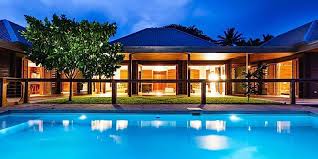Fiji: Your Guide to Buying Property in Paradise

Strong 8k brings an ultra-HD IPTV experience to your living room and your pocket.
Fiji, a stunning archipelago nation in the South Pacific, beckons with its turquoise waters, swaying palm trees, and warm hospitality. Beyond the idyllic vacation experience, Fiji offers a chance to own a piece of paradise. Whether you dream of a permanent island retreat, a lucrative investment property, or a vacation getaway, buy property in fiji can be a rewarding adventure. But before you pack your bags and start browsing beachfront listings, it's crucial to understand the legalities, processes, and considerations involved.
Foreign Ownership and Investment Options
Fiji welcomes foreign investment in real estate, offering several options for ownership:
Freehold Land: This grants complete ownership of the land and any structures built on it. Freehold land is the most sought-after type, particularly for beachfront properties.
Leasehold Land: You purchase the right to use the land for a specific period, typically ranging from 30 to 90 years. Leasehold properties are often more affordable than freehold, but renewal terms and fees should be carefully reviewed.
Strata Title: This grants ownership of a specific unit within a larger development, such as an apartment complex or resort. Strata ownership comes with shared ownership of common areas and adherence to community regulations.
Investor Permit: Foreigners intending to purchase property for business purposes, such as rental properties, may require an Investor Permit. This involves registering a company, obtaining a Foreign Investment Registration Certificate, and meeting specific investment thresholds.
Finding Your Dream Property
With a clear understanding of ownership options, it's time to explore the Fijian property market. Here are some resources to get you started:
Real Estate Websites: Reputable websites like Property.com.fj and realestate.com.au list properties for sale across Fiji's islands.
Real Estate Agents: Partnering with a licensed real estate agent with expertise in the specific area you're interested in is highly recommended. They can guide you through the process, handle negotiations, and ensure a smooth transaction.
Local Newspapers and Publications: Local publications often carry property listings alongside valuable insights into the market trends.
Location, Location, Location: Fiji boasts diverse landscapes, from the bustling city life of Suva to the secluded serenity of outer islands. Consider your priorities:
Island Living: Outer islands offer a true escape, but accessibility and amenities might be limited.
Mainland Convenience: Main islands like Viti Levu (housing Nadi and the Denarau tourist hub) offer easier access to infrastructure and amenities.
Development Potential: Consider if you prefer a fully developed area or a property with potential for future development.
Understanding the Buying Process
Once you've identified a potential property, here's a general overview of the buying process:
Make an Offer: Negotiate a price with the seller through your real estate agent.
Legal Due Diligence: Engage a lawyer specializing in Fijian property law to conduct thorough due diligence, verifying land title, development restrictions, and potential encumbrances.
Sale and Purchase Agreement: Once terms are agreed upon, a formal Sale and Purchase Agreement is drafted by your lawyer.
Deposit and Taxes: A deposit is typically paid upon signing the agreement. Be prepared for stamp duty and registration fees.
Foreign Investment Approval: For certain transactions, especially those involving business ventures, a Foreign Investment Registration Certificate might be required. This process can take several weeks.
Settlement: Upon final approval and payment, the property title is transferred to your name.
Financing: While some sellers may offer seller financing, securing a mortgage from a Fijian bank is a common approach. Foreign buy property in fiji might face stricter requirements and higher interest rates compared to local residents.
Additional Costs and Considerations
Fiji Revenue & Customs Authority (FRCA): Expect to register for a Tax Identification Number (TIN) and potentially Value Added Tax (VAT) if your purchase involves business activities.
Ongoing Costs: Factor in annual property taxes, maintenance costs, and potential building insurance, especially for beachfront properties.
Building Regulations: Ensure any planned renovations or construction adhere to local building codes and obtain necessary permits.
Beyond the Transaction: Living in Fiji
Owning property in Fiji comes with the possibility of residency. Depending on your investment amount and purpose, you might qualify for a Permanent Residency Visa. Research visa requirements and consult with an immigration lawyer for personalized guidance.
Cultural Integration: Fiji is a nation rich in culture and tradition. Embrace the opportunity to learn the local language (Fijian and Hindi), respect customs, and contribute to the vibrant island community.
Note: IndiBlogHub features both user-submitted and editorial content. We do not verify third-party contributions. Read our Disclaimer and Privacy Policyfor details.


